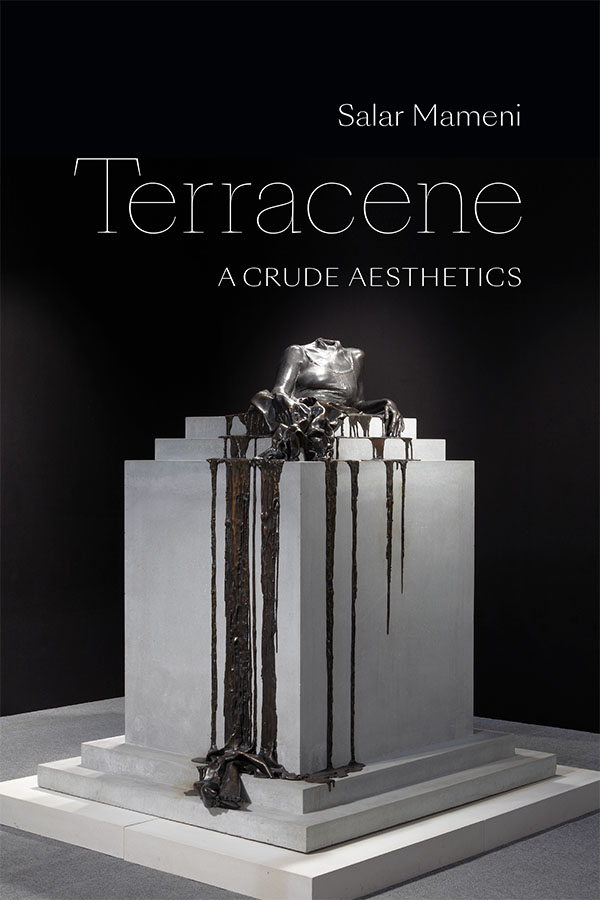Please join us in-person on Monday, March 4, 2024 from 4-5:30pm for an Authors Meet Critics panel on Terracene, by Professor Salar Mameni, Assistant Professor in UC Berkeley’s Department of Ethnic Studies. Professor Mameni will be joined by Mayanthi Fernando, Associate Professor of Anthropology at UC Santa Cruz; Sugata Ray, Associate Professor of South and Southeast Asian Art and Architecture in the Departments of History of Art and South & Southeast Asian Studies at UC Berkeley; and Stefania Pandolfo, Professor of Anthropology at UC Berkeley.
This panel is co-sponsored by the Program in Critical Theory, the Art Research Center, the Center for Race and Gender, the Center for the Study of Sexual Culture, the Department of Art History, the Department of Ethnic Studies, the South Asia Art Initiative at the Institute for South Asia Studies, and the Environmental Arts and Humanities Initiative.
About the Book
 In Terracene, Professor Salar Mameni historicizes the popularization of the scientific notion of the Anthropocene alongside the emergence of the global war on terror. Mameni theorizes the Terracene as an epoch marked by a convergence of racialized militarism and environmental destruction. Both the Anthropocene and the war on terror centered the antagonist figures of the Anthropos and the terrorist as responsible for epochal changes in the new geological and geopolitical world orders. In response, Mameni shows how the Terracene requires radically new engagements with terra (the earth), whose intelligence resides in matters such as oil and phenomena like earthquakes and fires. Drawing on the work of artists whose practices interrogate histories of settler-colonial and imperial interests in land and resources in Iran, Iraq, Yemen, Kuwait, Syria, Palestine, and other regions most affected by the war on terror, Mameni offers speculative paths into the aesthetics of the Terracene.
In Terracene, Professor Salar Mameni historicizes the popularization of the scientific notion of the Anthropocene alongside the emergence of the global war on terror. Mameni theorizes the Terracene as an epoch marked by a convergence of racialized militarism and environmental destruction. Both the Anthropocene and the war on terror centered the antagonist figures of the Anthropos and the terrorist as responsible for epochal changes in the new geological and geopolitical world orders. In response, Mameni shows how the Terracene requires radically new engagements with terra (the earth), whose intelligence resides in matters such as oil and phenomena like earthquakes and fires. Drawing on the work of artists whose practices interrogate histories of settler-colonial and imperial interests in land and resources in Iran, Iraq, Yemen, Kuwait, Syria, Palestine, and other regions most affected by the war on terror, Mameni offers speculative paths into the aesthetics of the Terracene.
Panelists

Salar Mameni is an Assistant Professor in UC Berkeley’s Department of Ethnic Studies and an art historian specializing in contemporary transnational art and visual culture in the Arab/Muslim world with an interdisciplinary research on racial discourse, transnational gender politics, militarism, oil cultures and extractive economies in West Asia. He has published articles in Resilience, Signs, Women & Performance, Al-Raida Journal, Fuse Magazine, Fillip Review and Canadian Art Journal. Salar’s first book, Terracene: A Crude Aesthetics (Duke University Press, 2023), considers the emergence of the Anthropocene as a new geological era in relation to the concurrent declaration of the War on Terror in the early 2000s. Playing on the words “terror” and “terra,” I propose the term “Terracene” in order to think the planetary in conjunction with ongoing militarization of transnational regions under terror. Terracene engages contemporary art and aesthetic productions, paying particular attention to artists navigating the geopolitics of petrocultures and climate change.

Mayanthi Fernando is a Associate Professor of Anthropology at UC Santa Cruz. She is author of The Republic Unsettled: Muslim French and the Contradictions of Secularism (Duke University Press, 2014), which alternates between an analysis of Muslim French politics, ethics, and social life and the contradictions of French secularity (laïcité) that this new Muslim subjectivity reflects and refracts. Her second book discusses the secularity of the post-humanist turn that asks whether “natureculture” – a reversal of the distinction between nature and the human – might be extended to “supernatureculture.”

Sugata Ray is Associate Professor of South and Southeast Asian Art and Architecture in the Departments of History of Art and South & Southeast Asian Studies and Director of the South Asia Art Initiative and the Climate Change Initiative at the University of California, Berkeley. His research and writing focus on climate change and the arts from the 1500s onwards. Ray’s recent books include Climate Change and the Art of Devotion: Geoaesthetics in the Land of Krishna, 1550–1850 (2019; awarded the Society of Architectural Historians of Great Britain’s Alice Davis Hitchcock Medallion and the American Academy of Religion’s Religion and the Arts Book Award) and Water Histories of South Asia: The Materiality of Liquescence (coedited; 2020). He is currently writing a book on the question of the animal and animality in the early modern period and co-editing Ecologies, Aesthetics, and Histories of Art (2024).

Stefania Pandolfo is Professor of Anthropology at UC Berkeley. She studies theories and forms of subjectivity, and their contemporary predicaments in the Middle Eastern and Muslim world. Her current project is a study of emergent forms of subjectivity in Moroccan modernity at the interface of “traditional therapies” and psychiatry/psychoanalysis, exploring theoretical ways to think existence, possibility and creation in a context of referential and institutional instability and in the aftermath of trauma, based on ethnographic research on spirit possession and the “cures of the jinn”, and on the experience of madness in a psychiatric hospital setting.
View Map